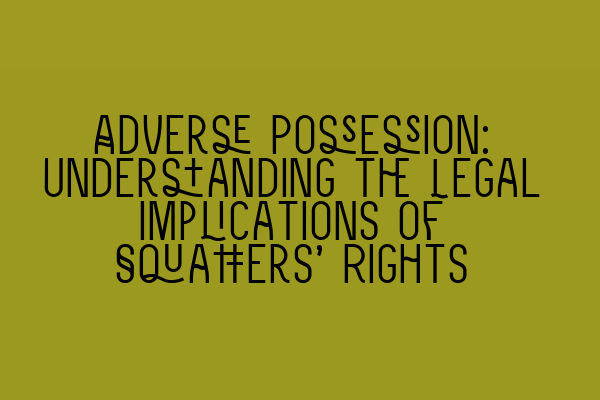Adverse Possession: Understanding the Legal Implications of Squatters’ Rights
Welcome to SQE Property Law & Land Law, your trusted solicitors for all property-related matters. In this blog post, we will delve into the intricacies of adverse possession and the legal implications it holds. Understanding the concept of squatters’ rights is essential for property owners and aspiring property lawyers alike.
What is Adverse Possession?
Adverse possession refers to a legal principle that allows an individual to claim ownership of someone else’s land or property through continuous and exclusive possession for a specified period of time. This principle is often referred to as squatters’ rights.
Adverse possession can be a complex and sensitive issue, as it raises questions about the rights of the original property owner and the legal rights of the individual claiming adverse possession. As experts in property law, we aim to provide clarity on this subject to help both property owners and legal professionals navigate the intricacies of the law.
The Legal Requirements for Adverse Possession
In order to claim adverse possession, certain legal requirements must be met. These requirements include:
- Actual Possession: The claimant must demonstrate actual physical possession of the land or property. They must use the land as if they were the true owner, excluding others from using or accessing it.
- Exclusive Possession: The claimant must possess the land exclusively, without sharing possession with the original owner or anyone else.
- Open and Notorious Possession: The claimant’s possession of the land must be obvious and open, without any attempts to hide or conceal it.
- Continuous Possession: The claimant must possess the land continuously for a specific period of time, typically ranging from 10 to 12 years.
- Hostile Possession: The claimant’s possession of the land must be without the permission or consent of the original owner.
Meeting these legal requirements is crucial when claiming adverse possession. It is important to gather evidence, such as photographs, witness statements, and utility bills, to support your claim if you find yourself in such a situation.
The Importance of Seeking Legal Advice
As with any legal matter, seeking professional advice is crucial. If you are facing a potential adverse possession claim or wish to claim adverse possession yourself, it is essential to consult with an experienced property lawyer.
At SQE Property Law & Land Law, our team of expert solicitors can guide you through the process, ensuring that your rights are protected and providing you with the best legal advice tailored to your specific circumstances. With our expertise in property law, we can help you navigate the complex world of adverse possession and its legal implications.
Conclusion
Understanding the legal implications of adverse possession or squatters’ rights is vital for property owners and legal professionals alike. Meeting the necessary legal requirements and seeking expert legal advice are key steps in dealing with adverse possession claims.
If you require legal assistance with adverse possession or any other property-related matter, please do not hesitate to contact SQE Property Law & Land Law. Our team of solicitors is here to provide you with professional and reliable advice to protect your property rights.
For more information on related topics, please visit our other articles:
